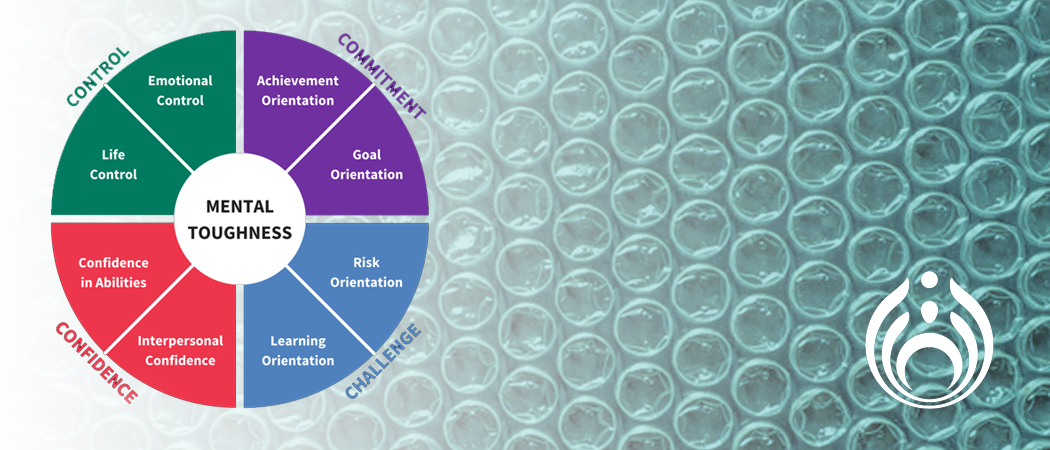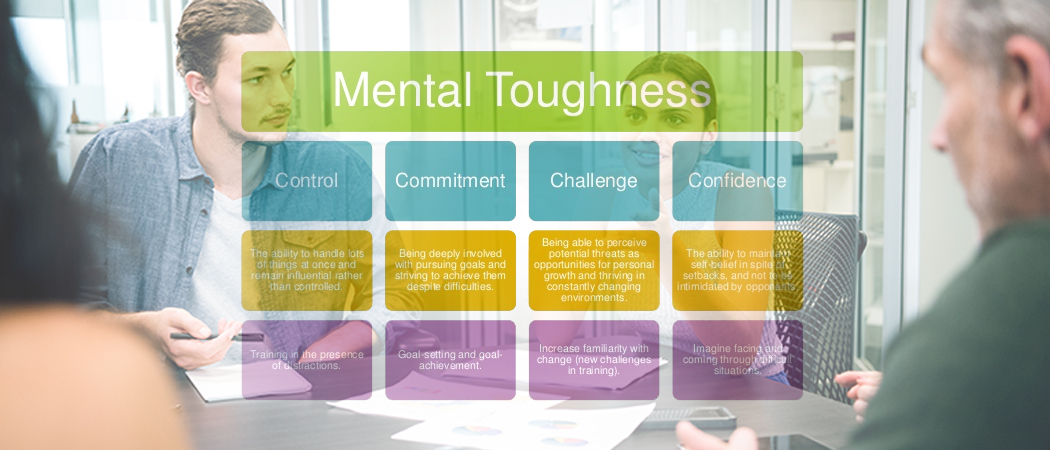What Is Mental Toughness?
You’ve probably heard the term mental toughness thrown around a lot. Whether it’s an athlete pulling off an impossible comeback, a survivor overcoming extreme adversity, or a business leader thriving under pressure, people often describe mental toughness as the secret ingredient to success.
But what does it actually mean? And is it something you’re just born with, or can you develop it over time?
The good news? Mental Toughness isn’t about being fearless or “toughing it out” alone. It’s about building the mindset and skills to stay strong, focused, and resilient—no matter what life throws at you.
The Science Behind Mental Toughness
Leading practitioners Dr. Peter Clough and Doug Strycharczyk have identified eight key factors that make up Mental Toughness, all of which fall under four core areas: Control, Confidence, Challenge, and Commitment. These traits help determine how we respond to stress, pressure, and challenges—regardless of the circumstances.
Rather than being a macho or superhuman quality, Mental Toughness is a personality trait that anyone can strengthen. It’s closely linked to resilience, grit, and emotional control – all of which play a huge role in achieving success and well-being.
So, what exactly makes up mental toughness? Let’s break it down.

The 8 Factors of Mental Toughness Explained
Challenge Construct
✅ Factor 1: Learning Orientation – “What can I learn?”
Professionals with a strong learning orientation see every challenge as an opportunity to grow. Rather than fearing feedback or setbacks, they actively seek out learning experiences.
💡 Career Impact: Employees who embrace lifelong learning are more adaptable to industry changes, making them prime candidates for promotions and leadership roles. For example, a marketing manager who continuously upskills in digital analytics will stay ahead of trends and become indispensable to their organization.
✅ Factor 2: Risk Orientation – “I am driven to succeed.”
Risk orientation is about an individual’s attitude toward change and new experiences. While some avoid uncertainty, mentally tough professionals see change as a chance to innovate and grow.
💡 Career Impact: Those who take calculated risks—whether by volunteering for high-profile projects or embracing new technologies—position themselves as valuable assets. A finance professional who champions AI-driven forecasting models, despite initial skepticism, could secure a leadership role for driving innovation.
Confidence Construct
✅ Factor 3: Confidence in One’s Ability – “I trust my skills and experience.”
This is the self-belief that you have the knowledge, skills, and experience to succeed. It allows professionals to take on new tasks with a problem-solving mindset rather than self-doubt.
💡 Career Impact: Employees who exude confidence (without arrogance) are more likely to be trusted with responsibility. A software developer who proactively suggests process improvements, rather than waiting for direction, is more likely to be promoted to a leadership position.
✅ Factor 4: Interpersonal Confidence – “I can influence others and stand my ground.”
The ability to communicate effectively, persuade others, and navigate workplace dynamics is crucial in career advancement.
💡 Career Impact: Professionals with strong interpersonal confidence advocate for themselves, negotiate better salaries, and lead teams effectively. Consider a sales executive who confidently presents a bold pitch to senior leadership—earning their trust and landing a director position.
Commitment Construct
✅ Factor 5: Achievement Orientation – “I’ll do what it takes to succeed.”
This factor is all about reliability, tenacity, and following through on commitments.
💡 Career Impact: Those who consistently deliver high-quality work and meet deadlines become the go-to people for leadership opportunities. A project manager known for delivering results under pressure is often next in line for a promotion.
✅ Factor 6: Goal Orientation – “I like working to goals.”
Goal-oriented professionals set high standards for themselves and take ownership of their progress. They see goals as motivation rather than pressure.
💡 Career Impact: Individuals who proactively set and achieve goals stand out in performance reviews. A junior analyst who independently tracks KPIs and suggests improvements will likely fast-track their career.
Control Construct
✅ Factor 7: Emotional Control – “I can manage my emotions and support others.”
Emotional control helps professionals stay calm in high-pressure situations and maintain a balanced perspective.
💡 Career Impact: Leaders who handle stress with composure inspire confidence in their teams. An HR manager who remains level-headed while resolving workplace conflicts earns respect and is considered for higher leadership roles.
✅ Factor 8: Life Control – “I believe in my ability to shape my future.”
This factor relates to a person’s ability to maintain control over their own decisions, actions, and reactions—regardless of external circumstances.
💡 Career Impact: Those with strong life control proactively manage their careers rather than waiting for opportunities to come to them. A mid-level employee who takes charge of their professional development (by seeking mentorship or further education) increases their chances of career progression.

Ready to Strengthen Your Mental Toughness?
Mental toughness isn’t just a buzzword—it’s the foundation of success in today’s fast-paced professional world. By mastering the 8 Factors of Mental Toughness, you can enhance your resilience, build confidence, and position yourself for career growth and leadership opportunities.
Now that you understand what drives mental toughness, the next step is applying it. Whether you’re looking to sharpen your decision-making, improve goal-setting, or stay calm under pressure, we can help you develop the skills to thrive.
At Get Mentally Fit, we offer evidence-based tools and coaching to help individuals and teams harness mental toughness for peak performance. A great place to start is our Mental Fitness Check or Leader Support services, facilitated by our Principal Psychologist, Emily Johnson.
Take control of your career and mindset today.
📩 GET IN TOUCH to discover how we can help you or your team strengthen mental toughness.
📖 Learn more about our Mental Fitness Check or Leader Support services.
🚀 Explore our Tailored Workshops and build a high-performance, mentally resilient culture.
Your potential is limitless—let’s unlock it together!


